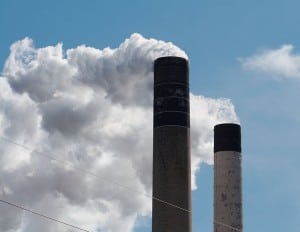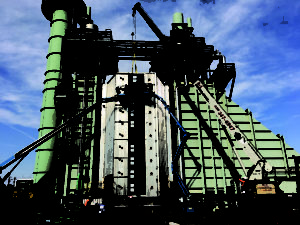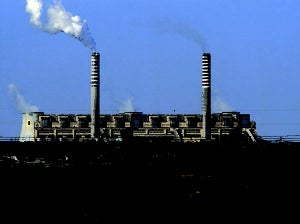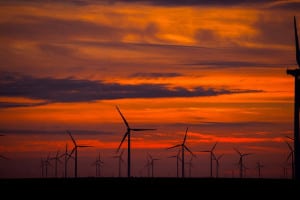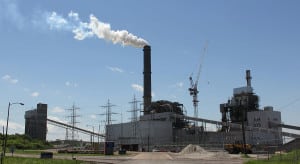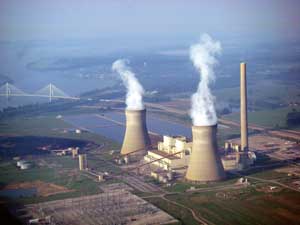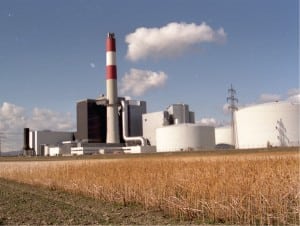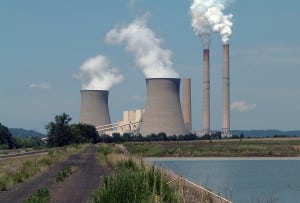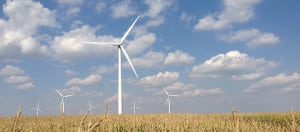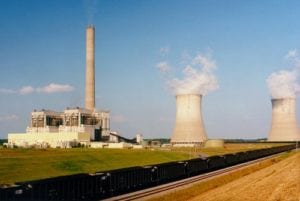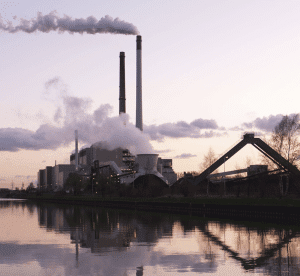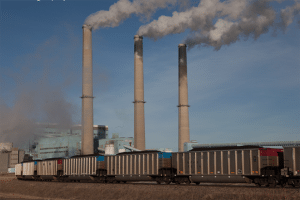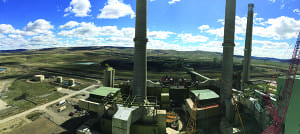emissions
-
Climate change
Dominion Latest to Set Net-Zero Carbon Goal
Richmond, Virginia-based Dominion Energy has joined a growing list of power companies establishing net-zero emissions targets. The company, which has more than 7 million electricity and natural gas customers in 18 states, said it intends to reach its carbon dioxide and methane reduction goals by 2050. Under the net-zero framework, the company is committing to […]
-
Fuel
Is Biomass Dead?
With subsidies running short and emissions regulations still a challenge, the promise of biomass as a sustainable source for utility-scale power generation remains elusive. Yet, there are novel applications
-
Carbon Capture
Policy Support for Carbon Capture Critical to Clean Energy Future
Analysis by both the Intergovernmental Panel on Climate Change and International Energy Agency shows that achieving a zero-carbon energy system by 2050 will require large-scale deployment of carbon capture
-
News
Coal Is Out as APS Sets Carbon-Free Goal
Arizona Public Service (APS) announced Jan. 22 that it plans for all its power generation to be carbon-free by 2050, and also said it plans to produce nearly half its power from renewable sources by 2030. APS joins other U.S. utilities who have put forth similar goals in recent years. APS, which has been criticized […]
-
Markets
Is Carbon Pricing the Key to a Clean Energy Future? [PODCAST]
The New York Independent System Operator (NYISO) has proposed incorporating the social cost of carbon into the wholesale price of electricity. According to an October-released study conducted by the consulting firm Analysis Group, “A carbon price in NYISO’s competitive wholesale power markets can help deliver New York’s clean-energy transition in faster, cheaper, more reliable, more […]
-
News
Using Technology to Tackle Power Plant Emissions
Power plant owners and operators have a range of systems available to help reduce pollutants at their facilities, depending on a number of factors. And industry experts agree—there is no “one size fits
-
News
Poland Pushing Back Against EU Goal to End Coal-Fired Generation
Polish officials have said it is “not possible” for the country to meet the European Union’s (EU’s) goal of cutting net carbon emissions to zero by 2050, and as such the government will continue to
-
Hydrogen
GE Unveils New H-Class Gas Turbine—and Already Has a First Order
GE on Oct. 1 unveiled the 7HA.03, the newest model in its 2014-launched high efficiency air-cooled (HA) gas turbine line. On Oct. 2, it also announced that Florida Power and Light’s (FPL’s) Dania Beach Clean Energy Center will be the first to showcase two of the “world’s largest, most efficient, and flexible gas turbines” for the 60-Hz […]
-
News
Duke Energy, American Electric Power Separately Seeking to Go Net-Zero Carbon by 2050
Two formidable U.S. coal power generators this week separately revised their carbon dioxide emissions reduction targets. Duke Energy announced it would achieve net-zero carbon emissions by 2050. American Electric Power (AEP), meanwhile, said it would extend its target from 60% to 70% from 2000 levels by 2030, and by more than 80% by 2050—but it […]
-
News
Nine Utility Companies Suing Trump Over Emissions Rule
A coalition of nine utility companies is suing the Trump administration over its plan to replace the Obama-era Clean Power Plan. New York-based Consolidated Edison said the Affordable Clean Energy, or ACE, rule undermines efforts the companies already have in place to cut greenhouse gas emissions from power generation. The companies, who call their group […]
-
Gas
Adding Fog for Power Augmentation and Emission Reduction
A pilot project was initiated by China’s largest energy provider to test the effectiveness of fog-based power augmentation for a gas turbine at a compressor station. The system provided a significant
-
News
BHP, Mitsubishi Partner on Emissions Reduction Technologies
BHP and Mitsubishi Development Pty (MDP) in late June signed a memorandum of understanding for joint research, development, and deployment of greenhouse gas emissions reduction technologies in several countries, including projects with battery storage, solar, and carbon capture and storage (CCS). The agreement, signed in Tokyo, Japan, on June 20, also calls for research into […]
-
News
AEP Will Close 1,300-MW Indiana Coal Unit
A federal judge in Ohio on July 18 approved American Electric Power’s (AEP’s) plan to close Unit 1 of its two-unit, 2,600-MW coal-fired Rockport Plant in Indiana. The modified consent decree approved by the U.S. District Court for the Southern District of Ohio on Thursday is the latest chapter in a long-running dispute among AEP, […]
-
News
Power Plant Emissions Down Substantially in U.S. Since 1990
Power plant SO2 and NOx emissions have decreased 92% and 84%, respectively, since Congress passed major amendments to the Clean Air Act in 1990. Meanwhile, mercury air emissions from power plants have decreased 90% since 2000, as federal limits on mercury and other hazardous air pollutants from coal-fired power plants went into effect in 2015. […]
-
News
Utility Group Under Congressional Investigation Will Disband
A utility industry coalition that has often challenged stricter air pollution and climate rules for power generation said it will dissolve. The Utility Air Regulatory Group (UARG), which has been under investigation from the House Energy and Commerce Committee due to its relationship with the Environmental Protection Agency’s (EPA’s) top air policy official and his […]
-
News
EPA to Retain Primary NAAQS for Sulfur Dioxide
The Environmental Protection Agency (EPA) will refrain from amending the National Ambient Air Quality Standards (NAAQS) for sulfur dioxide (SO2), retaining a 2010 rule, which it said adequately protects public health. The agency on Feb. 25 said in a notice that a periodically required review of the primary—or health-based—rule concluded no revision was necessary. The […]
-
O&M
Coal Plant Improves Combustion, Lowers Emissions, and Boosts Output
Coal power plants today must find ways to operate economically if they are to survive. Every area of cost reduction must be investigated. On the maintenance side, time savings must be sought—to reduce
-
News
Report: CO2 Emissions from Power Sector Rising
A new study from an economic research group shows that U.S. emissions of carbon dioxide (CO2) rose about 3.4% last year, including a 1.9% rise in emissions from power generation. The New York-based Rhodium Group, which released its findings on Jan. 8, said its study used data from the U.S. Energy Information Administration (EIA) and […]
-
News
EPA: Mercury Rules for Coal, Oil Power Units Not ‘Appropriate and Necessary’
Because compliance costs to coal- and oil-fired power plants for the Mercury and Air Toxics Standards (MATS) far exceed quantifiable benefits to regulating hazardous air pollutant (HAP) emissions, the Trump administration has proposed it is not “appropriate and necessary” to regulate HAP emissions from power plants under Section 112 of the Clean Air Act (CAA), […]
-
News
Xcel’s Latest Plan: Carbon-Free by 2050
Xcel Energy has announced its plan to move to 100% carbon-free power generation by 2050, with the utility also saying it will reduce carbon emissions by 80% by 2030, from 2005 levels. Xcel, headquartered in Minneapolis, Minnesota, serves customers in eight states and over the past two years has announced a significant number of renewable […]
-
News
Utility Agrees to Close Arkansas’ Largest Coal Plants
Entergy Arkansas said it will close the state’s two largest coal-fired power plants, along with one gas-fired plant, by 2030 as part of a settlement with environmental groups that sued the utility in federal court for alleged violations of the Clean Air Act (CAA). The Sierra Club and the Washington, D.C.-based National Parks Conservation Association […]
-
News
Particulate Matter Should Be Focus of Air Emissions Regulations
Residents of Texas living downwind of coal-fired power plants would be far better off today if regulators had focused on cutting particle-forming SO2 emissions rather than concentrating so keenly on ozone-causing emissions, according to a recent study conducted by researchers at Rice University in Houston, Texas. The head of the study, environmental engineer Daniel Cohan, […]
-
Coal
Advanced Coal Technologies Improve Emissions and Efficiency
New coal-fired generating plants are not showing up in the U.S. Elderly plants are retiring in large numbers. But other parts of the world continue to develop coal generation. Advances in combustion and
-
Legal & Regulatory
Coal’s ACE in the Hole? New Rule Still Faces Headwinds
The Trump administration has extended a potential lifeline to coal-fired power plants with its Affordable Clean Energy (ACE) rule. Now the debate is about how much the plan will actually help coal generation. Energy analysts and other industry experts who spoke with POWER on August 28 say the new rule, which would give individual states the […]
-
Legal & Regulatory
Trump Emissions Plan Aims to Boost Coal-Fired Power
The Trump administration has proposed an overhaul of U.S. power plant emissions rules, unveiling a plan that would allow individual states to determine how they will regulate pollutants. The proposal, called the Affordable Clean Energy (ACE) plan and discussed during the keynote address at the MEGA Symposium in Baltimore, Maryland, on August 21, would essentially dissolve […]
-
Legal & Regulatory
States Would Set Rules Under Trump Emissions Plan
A report from POLITICO says the Trump administration’s rollback of the Obama-era Clean Power Plan (CPP) would give individual states more leeway to set their own rules governing emissions from power plants. POLITICO, which covers politics and policy both in the U.S. and internationally, said its review of a draft document, and information from a […]
-
Legal & Regulatory
Extensive Planning, Innovative Work Strategies, Teamwork Combine for Successful SCR Project
A coal-fired plant in Colorado needed to further reduce its emissions to comply with more-stringent regulations. The work presented several challenges, and the owner and contractors worked together to complete
-
Coal
South Korean Plant Finds Flexibility with Advanced CFB Technology
The Samcheok Green Power Plant requires less maintenance and is more cost-effective than conventional coal plants, and more environmentally friendly with its use of once-through ultrasupercritical boilers
-
Renewables
More Efficient with Fewer Emissions: Cement Factory Finds Sugar-Based Biomass a Sweet Solution
Environmental regulations and a need to reduce its fuel consumption provide the incentive for an Egyptian plant to change its manufacturing process. Energy companies constantly grapple with controlling the
-
Coal
India’s Power Industry Struggles to Solve Pollution Problems
In a bid to tamp down pollution, India’s government in December 2015 notified the country’s coal generators they would need to meet—for the first time—new emissions limits for nitrogen oxides (NOx), sulfur dioxide (SO2), and mercury, as well as tightened limits for particulate matter (PM) and water consumption. The gazetted notification gave new plants until […]

